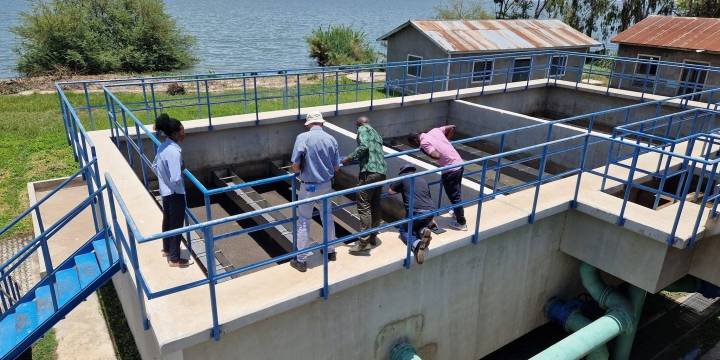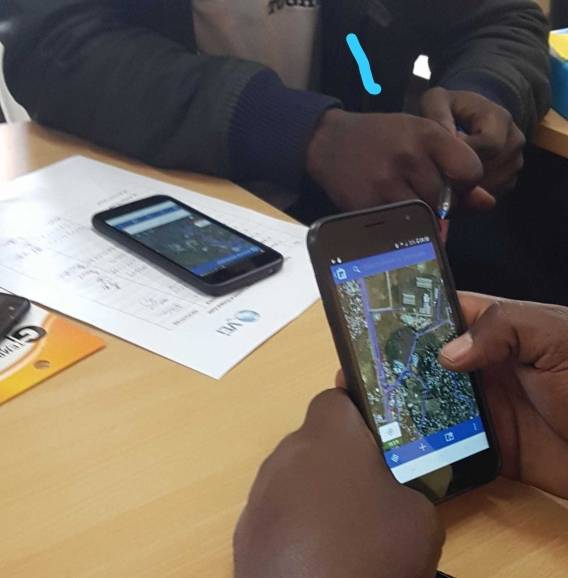
EU WOP Tanzania
- Tanzania


| Region: | Arusha, Dodoma, Mwanza |
| Period: | 2022-2026 |
| Project partners: | Arusha Urban Water Supply and Sanitation Authority (AUWSA), Dodoma Urban Water Supply and Sanitation Authority (DUWASA), Mwanza Urban Water Supply and Sanitation Authority (MWAUWASA) |
| Funding: | WaterWorX program by Ministry of Foreign Affairs |
VEI is responsible for the Water Operator Partnership in Arusha, Dodoma and Mwanza, under the umbrella of the WaterWorX program. The WWX program aims to contribute to ensuring sustainable access to safe drinking water and sanitation for 10 million people in the world by 2030. WWX is co-financed by the Ministry of Foreign Affairs of the Netherlands and 10 Dutch water companies. The program seeks to improve the technical and financial sustainability of water utilities via WOPs. The ambition of the partnership is to enable utilities to attract and manage large-scale investments.
WOP Arusha
Lying in the shadow of Mount Meru, Arusha is located in the northern highlands of Tanzania, in a green and fertile environment. For its water supply, the city depends largely on ground water (approx. 75%) and on water from the volcanic mount Meru. Recently, the available ground water sources have been expanded greatly, through implementation of an AfdB funded investment program. This ensured sufficient water availability to Arusha, but also presents some challenges to the utility.
VEI and AUWSA are partnering since 2018 and entered the second phase of their WWX WOP in 2022. This phase is building upon the achievements of phase 1, to further strengthen the safe and secure water supply to all in Arusha. Four of the working areas within this WOP are highlighted below.
Non-revenue water reduction
Being one of the oldest water utilities in Tanzania, the AUWSA network is aging and increasingly prone to burst and leakages. Combined with the drinking water production, NRW is high. Through implementation of online GIS and hydraulic modeling, the network is better understood. Leakage reporting provides valuable information on quality of potential for network rehabilitation and repair. Also, commercial losses are targeted, e.g., through water meter replacement.
Water quality improvement
As a consequence of the volcanic soil, groundwater in Arusha (and throughout the East-African Rift Valley, EARV) contains high amounts of fluoride. Although being beneficial at low concentrations, at higher concentrations this poses significant adverse health effects (e.g., dental, and skeletal fluorosis, neurological effect). In the WOP, a pilot defluoridation treatment plant is operated successfully. In phase 2, we are working towards full-scale implementation of this technology. This would not only greatly improve public health in Arusha, but also serve as an example for the entire EARV and beyond.
Water and sanitation for all
After implementation of a pro-poor strategy for new connections by VEI in phase 1, this approach will be continued in phase 2, with the emphasis on sustainability. Furthermore, we aim to realize School WASH facilities at 30 government schools in Arusha Urban, thereby providing tens of thousands of school kids with safe and clean water and sanitation services.
Asset management production
As a part of the AfdB-funded project to increase the water production infrastructure, many new production and distribution assets became operational in the recent years. Implementation of asset management thinking and tools to assist on this is therefore essential to prevent unnecessary failure of materials and equipment. Another focal point is improvement of energy efficiency. An energy audit will be performed, to identify reduction measures, and reduce the energy costs for AUWSA.
WOP Dodoma
The city of Dodoma has been expanding rapidly over the past years, due to all government institutions recently being moved to this capital city. The water supply in the region can not keep up with this rapid growth, as there are no large water sources in the vicinity of the city. This results in high levels of intermittent water supply in the city, averaging 3.4 hours of supply per day. In the coming years, large infrastructure investment projects are foreseen, to expand the water production capacity in Dodoma considerably.
Within the WWX WOP between VEI and DUWASA, the focus is on improving operational and financial performance, as well as increasing access to and reliability of water supply to all. To reach these outcomes, DUWASA must overcome its current challenges, the most important of which are limited water availability, high non-revenue water (NRW), insufficient asset management and a lack of digitalization of the utility processes. On top of this, the project aims to provide close collaboration during the implementation of the external larger water infrastructure projects in Dodoma and will help DUWASA to bridge the gap with the current situation.
Four main working areas have been prioritized in Dodoma: operation and maintenance of 1) distribution and 2) production assets, 3) commercial operations and 4) management and leadership.
Water distribution
DUWASA is in need for an NRW baseline assessment, which will provide input to a NRW reduction strategy to be developed. A number of pilot DMA’s will be established to contribute to the baseline study. Operational staff will be trained and (some) equipment will be provided. GIS will be established (not in place upon initiation of the project), alongside with a draft hydraulic model. This will support DUWASA in the management and supervision of the ongoing and future investment projects, that also involve NRW reduction aspects.
Water production
Training and software will be provided to improve preventative maintenance of the production assets. Also, an energy audit will be developed to identify possibilities to reduce the energy costs. The WOP will focus on the increase of the water availability in the near term (5 years), to bridge the gap to the incoming longer-term investment projects (like Farkwa Dam and supply from Lake Victoria).
Commercial Operations
DUWASA is in need for a proper understanding of commercial (NRW) losses and implement activities (at pilot scale) accordingly. Also, a meter management policy will be developed.
Management and Leadership
A clear request is made for change management leadership, right from the start of the partnership. Based on the climatic survey and personal assessment an approach will be developed for workshops, training, and coaching.
WOP Mwanza
Mwanza, also known as Rock City, is situated at the southern shore of Lake Victoria. It is Tanzania’s second city in terms of population, with over one million inhabitants, making it of the main cities in the Lake Victoria Basin. The city is strongly entwined with the lake, which is an important source of food (fish) and acts as the main water source to Mwanza.
Since 2018 VEI and MWAWASA partner in a WWX WOP, mainly addressing six themes: capacity development, increasing cost coverage ratio, reducing non-revenue water (NRW), increase quality of customer service, implement a pro-poor approach and creating an enabling environment for improving operational and financial performance as well as attracting new investments. In the second phase of this partnership (2022-2026) the WOP will continue to accelerate improvements on those subthemes, of which four themes are highlighted below.
Asset management production
In phase 1, asset management software is introduced in Mwanza, to enable proper asset registry and implementation of a (preventive) maintenance schedule. In phase 2, the O&M staff will be provided with training and guidance to implement asset management thinking and to digitalize working processes. Energy costs are high for MWAWASA, and therefore opportunities will be identified to reduced energy use.
Non-revenue water reduction
Reduction of non-revenue water remains one of the biggest challenges in Mwanza, due to the rocky nature of the soil, and the significant commercial NRW-losses. Effective NRW-reduction measures, identified in phase 1, will be further studied. A start will be made with NRW monitoring on a zonal level, which provides more insight in sources and solutions for reducing NRW, that might be implemented in Mwanza.
New connections to low-income customers
With MWAWASA, a pro-poor strategy will be developed that provides solutions to customers who cannot afford connection fees, and which can sustainably be implemented by the utility on the long term. In phase 2, the focus is on developing and implementing the new strategy within MWAWASA.
Management and leadership
In close collaboration between VEI and MWAWASA, a training program will be developed and implemented within the utility. This program focuses on (change management) leadership development.
For more information please contact:
Andries van Eckeveld, Project Manager Tanzania
andries.vaneckeveld@vei.nl
